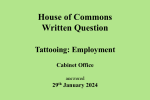
Sir Chris raises relevant post-EU Question about the European Court of Human Rights:
Christopher Chope Conservative, Christchurch
I thank my right hon. Friend for his sterling personal contribution to securing the full Brexit of our dreams, but may I remind him that there is an organisation still frustrating our power to control our own borders and laws? I am referring to the European Court of Human Rights. Can we have a debate about that Court, particularly in light of its judgment, reported in The Times law reports yesterday, in the case of Unuane? That is a case where we deported a foreign national offender who had been sentenced to five and a half years’ imprisonment for very serious immigration offences—facilitating other people to break our immigration laws. The Court has said that deportation was unlawful. Can we have a debate to discuss judge-made law, which the Court itself referred to? It said that it was interpreting the law itself, although it is not spelt out in article 8.
Jacob Rees-Mogg Lord President of the Council and Leader of the House of Commons
The official Home Office line is that the Home Office is disappointed with the judgment of the European Court of Human Rights, as it has a duty to protect the public by removing foreign criminals who violate our laws, and that is obviously right, but I would say to my hon. Friend that there is one fundamental difference between the ECJ and the European Court of Human Rights: ECJ judgments became our law automatically, but judgments of the European Court of Human Rights have to come through Parliament at some point to make our law compatible, but that ultimately is a choice. He will remember that was a choice we were very reluctant to make over voting rights for prisoners. The European Court of Human Rights has a different status—a lesser status—and the great protector of human rights in this nation is this House of Commons, not any court outside the country.
- ENDS -




